ASS072-1: Examining Barriers to Accessing Health and Social Care
VerifiedAdded on 2023/06/08
|7
|2098
|115
Essay
AI Summary
This essay explores the significant barriers that individuals with mental disorders face when trying to access health and social care services in the UK. It identifies key obstacles such as financial constraints, the shortage of mental health professionals, lack of mental health awareness and education, social stigma, and racial disparities. The essay discusses how these barriers impact access to treatment and support, leading to untreated mental health issues and adverse social and physical consequences. It concludes by emphasizing the importance of increasing public awareness and addressing these barriers to improve mental well-being and ensure that individuals receive the necessary care and support.
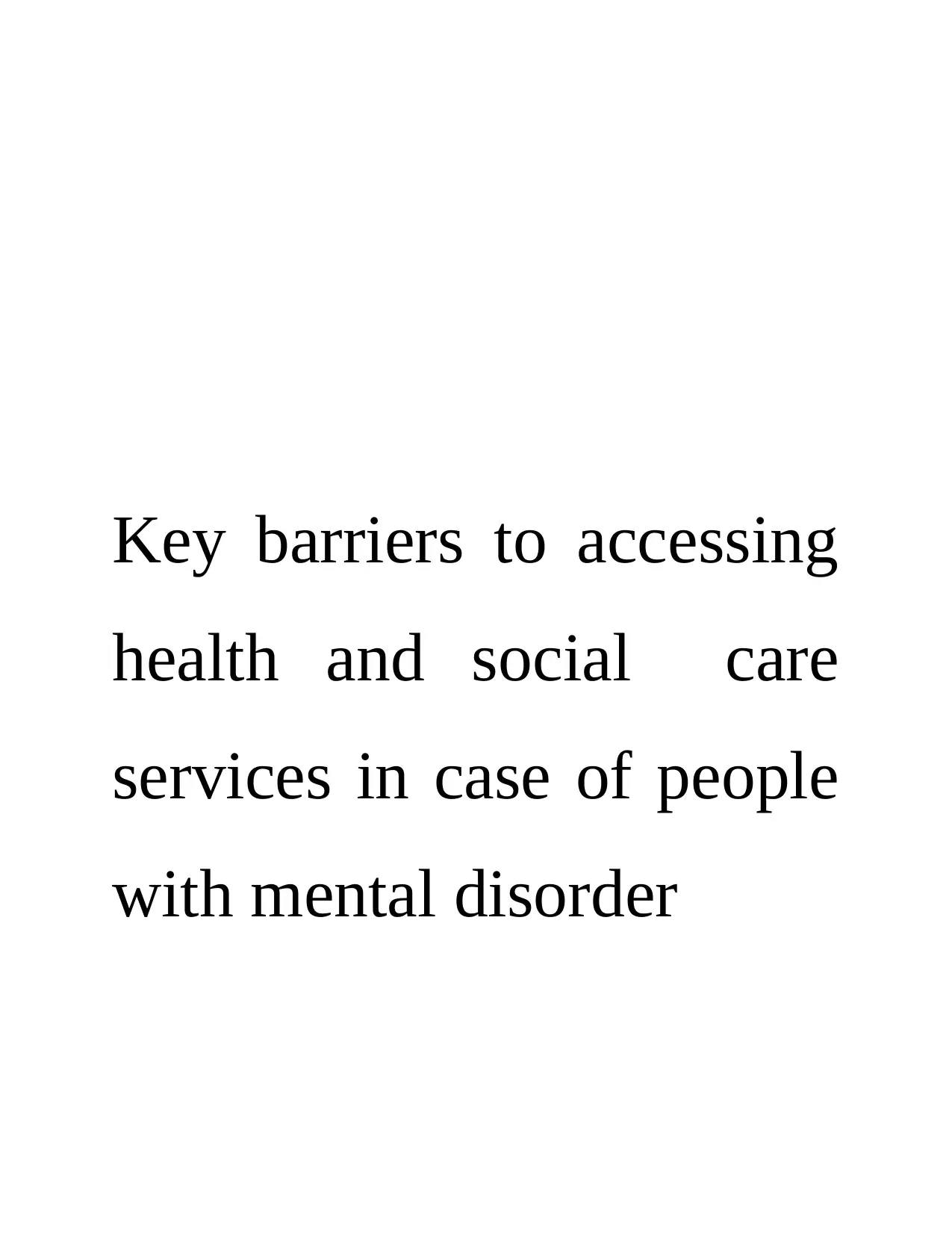
Key barriers to accessing
health and social care
services in case of people
with mental disorder
health and social care
services in case of people
with mental disorder
Paraphrase This Document
Need a fresh take? Get an instant paraphrase of this document with our AI Paraphraser

Contents
INTRODUCTION...........................................................................................................................1
MAIN BODY...................................................................................................................................1
CONCLUSION ...............................................................................................................................4
REFERENCES................................................................................................................................4
INTRODUCTION...........................................................................................................................1
MAIN BODY...................................................................................................................................1
CONCLUSION ...............................................................................................................................4
REFERENCES................................................................................................................................4
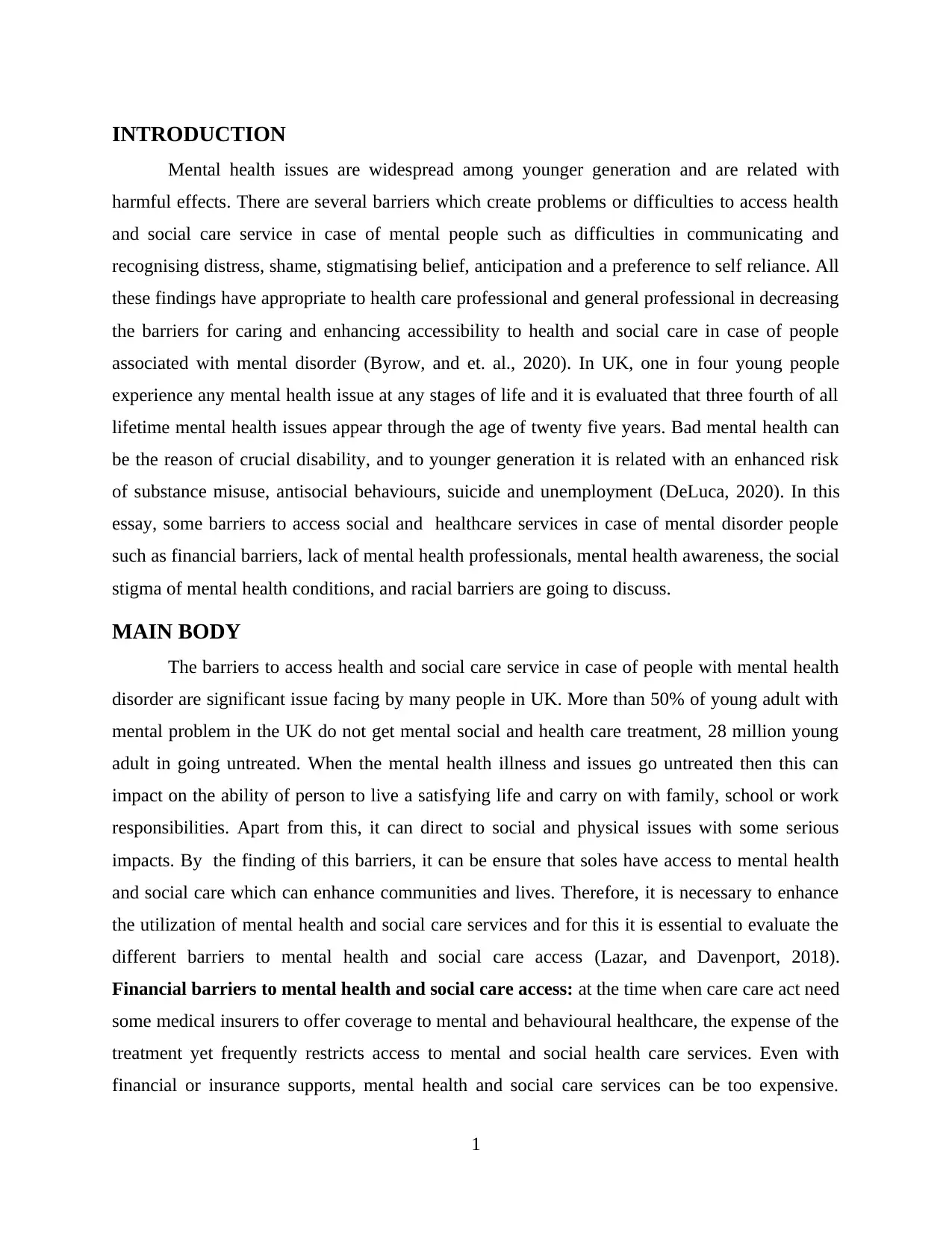
INTRODUCTION
Mental health issues are widespread among younger generation and are related with
harmful effects. There are several barriers which create problems or difficulties to access health
and social care service in case of mental people such as difficulties in communicating and
recognising distress, shame, stigmatising belief, anticipation and a preference to self reliance. All
these findings have appropriate to health care professional and general professional in decreasing
the barriers for caring and enhancing accessibility to health and social care in case of people
associated with mental disorder (Byrow, and et. al., 2020). In UK, one in four young people
experience any mental health issue at any stages of life and it is evaluated that three fourth of all
lifetime mental health issues appear through the age of twenty five years. Bad mental health can
be the reason of crucial disability, and to younger generation it is related with an enhanced risk
of substance misuse, antisocial behaviours, suicide and unemployment (DeLuca, 2020). In this
essay, some barriers to access social and healthcare services in case of mental disorder people
such as financial barriers, lack of mental health professionals, mental health awareness, the social
stigma of mental health conditions, and racial barriers are going to discuss.
MAIN BODY
The barriers to access health and social care service in case of people with mental health
disorder are significant issue facing by many people in UK. More than 50% of young adult with
mental problem in the UK do not get mental social and health care treatment, 28 million young
adult in going untreated. When the mental health illness and issues go untreated then this can
impact on the ability of person to live a satisfying life and carry on with family, school or work
responsibilities. Apart from this, it can direct to social and physical issues with some serious
impacts. By the finding of this barriers, it can be ensure that soles have access to mental health
and social care which can enhance communities and lives. Therefore, it is necessary to enhance
the utilization of mental health and social care services and for this it is essential to evaluate the
different barriers to mental health and social care access (Lazar, and Davenport, 2018).
Financial barriers to mental health and social care access: at the time when care care act need
some medical insurers to offer coverage to mental and behavioural healthcare, the expense of the
treatment yet frequently restricts access to mental and social health care services. Even with
financial or insurance supports, mental health and social care services can be too expensive.
1
Mental health issues are widespread among younger generation and are related with
harmful effects. There are several barriers which create problems or difficulties to access health
and social care service in case of mental people such as difficulties in communicating and
recognising distress, shame, stigmatising belief, anticipation and a preference to self reliance. All
these findings have appropriate to health care professional and general professional in decreasing
the barriers for caring and enhancing accessibility to health and social care in case of people
associated with mental disorder (Byrow, and et. al., 2020). In UK, one in four young people
experience any mental health issue at any stages of life and it is evaluated that three fourth of all
lifetime mental health issues appear through the age of twenty five years. Bad mental health can
be the reason of crucial disability, and to younger generation it is related with an enhanced risk
of substance misuse, antisocial behaviours, suicide and unemployment (DeLuca, 2020). In this
essay, some barriers to access social and healthcare services in case of mental disorder people
such as financial barriers, lack of mental health professionals, mental health awareness, the social
stigma of mental health conditions, and racial barriers are going to discuss.
MAIN BODY
The barriers to access health and social care service in case of people with mental health
disorder are significant issue facing by many people in UK. More than 50% of young adult with
mental problem in the UK do not get mental social and health care treatment, 28 million young
adult in going untreated. When the mental health illness and issues go untreated then this can
impact on the ability of person to live a satisfying life and carry on with family, school or work
responsibilities. Apart from this, it can direct to social and physical issues with some serious
impacts. By the finding of this barriers, it can be ensure that soles have access to mental health
and social care which can enhance communities and lives. Therefore, it is necessary to enhance
the utilization of mental health and social care services and for this it is essential to evaluate the
different barriers to mental health and social care access (Lazar, and Davenport, 2018).
Financial barriers to mental health and social care access: at the time when care care act need
some medical insurers to offer coverage to mental and behavioural healthcare, the expense of the
treatment yet frequently restricts access to mental and social health care services. Even with
financial or insurance supports, mental health and social care services can be too expensive.
1
⊘ This is a preview!⊘
Do you want full access?
Subscribe today to unlock all pages.

Trusted by 1+ million students worldwide
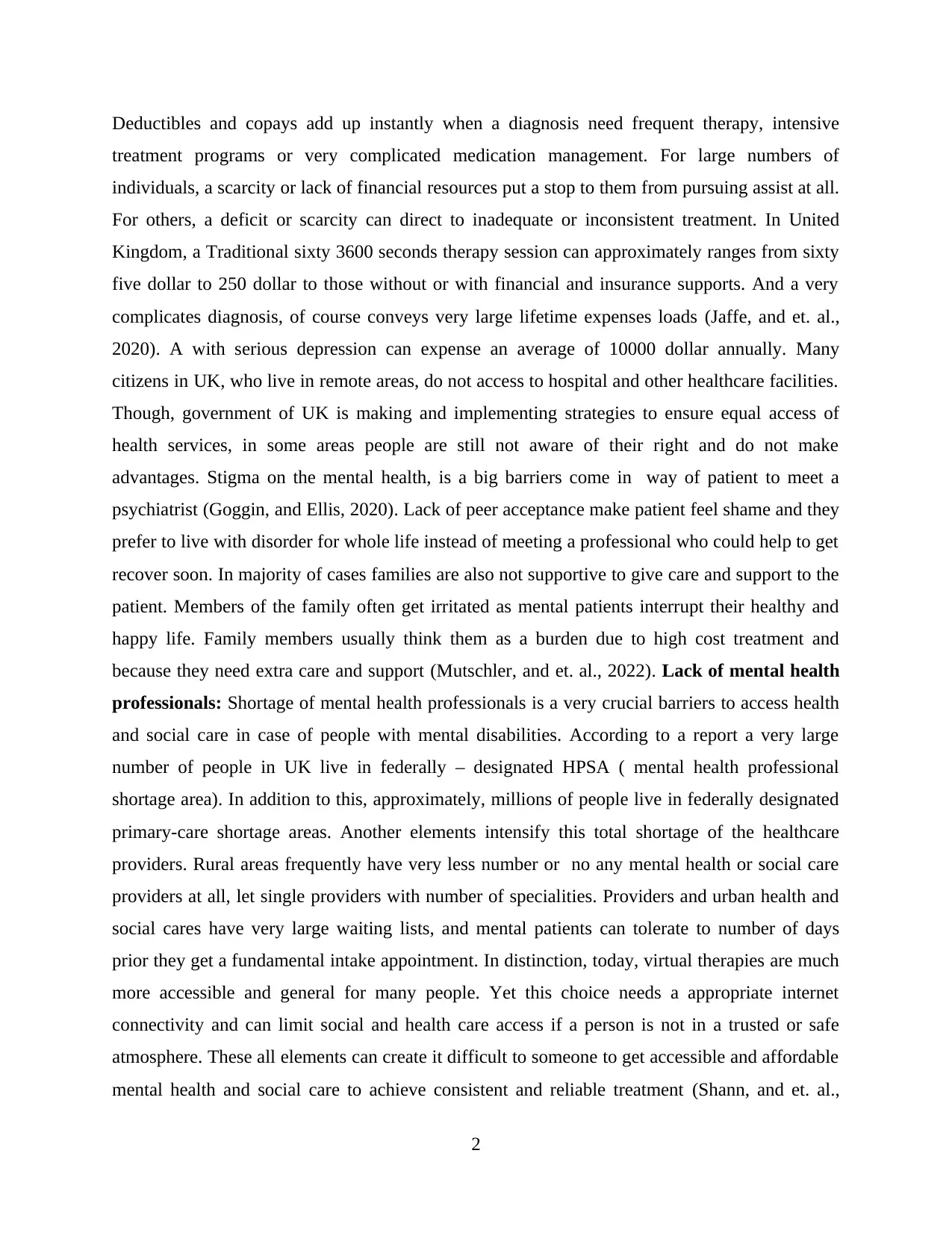
Deductibles and copays add up instantly when a diagnosis need frequent therapy, intensive
treatment programs or very complicated medication management. For large numbers of
individuals, a scarcity or lack of financial resources put a stop to them from pursuing assist at all.
For others, a deficit or scarcity can direct to inadequate or inconsistent treatment. In United
Kingdom, a Traditional sixty 3600 seconds therapy session can approximately ranges from sixty
five dollar to 250 dollar to those without or with financial and insurance supports. And a very
complicates diagnosis, of course conveys very large lifetime expenses loads (Jaffe, and et. al.,
2020). A with serious depression can expense an average of 10000 dollar annually. Many
citizens in UK, who live in remote areas, do not access to hospital and other healthcare facilities.
Though, government of UK is making and implementing strategies to ensure equal access of
health services, in some areas people are still not aware of their right and do not make
advantages. Stigma on the mental health, is a big barriers come in way of patient to meet a
psychiatrist (Goggin, and Ellis, 2020). Lack of peer acceptance make patient feel shame and they
prefer to live with disorder for whole life instead of meeting a professional who could help to get
recover soon. In majority of cases families are also not supportive to give care and support to the
patient. Members of the family often get irritated as mental patients interrupt their healthy and
happy life. Family members usually think them as a burden due to high cost treatment and
because they need extra care and support (Mutschler, and et. al., 2022). Lack of mental health
professionals: Shortage of mental health professionals is a very crucial barriers to access health
and social care in case of people with mental disabilities. According to a report a very large
number of people in UK live in federally – designated HPSA ( mental health professional
shortage area). In addition to this, approximately, millions of people live in federally designated
primary-care shortage areas. Another elements intensify this total shortage of the healthcare
providers. Rural areas frequently have very less number or no any mental health or social care
providers at all, let single providers with number of specialities. Providers and urban health and
social cares have very large waiting lists, and mental patients can tolerate to number of days
prior they get a fundamental intake appointment. In distinction, today, virtual therapies are much
more accessible and general for many people. Yet this choice needs a appropriate internet
connectivity and can limit social and health care access if a person is not in a trusted or safe
atmosphere. These all elements can create it difficult to someone to get accessible and affordable
mental health and social care to achieve consistent and reliable treatment (Shann, and et. al.,
2
treatment programs or very complicated medication management. For large numbers of
individuals, a scarcity or lack of financial resources put a stop to them from pursuing assist at all.
For others, a deficit or scarcity can direct to inadequate or inconsistent treatment. In United
Kingdom, a Traditional sixty 3600 seconds therapy session can approximately ranges from sixty
five dollar to 250 dollar to those without or with financial and insurance supports. And a very
complicates diagnosis, of course conveys very large lifetime expenses loads (Jaffe, and et. al.,
2020). A with serious depression can expense an average of 10000 dollar annually. Many
citizens in UK, who live in remote areas, do not access to hospital and other healthcare facilities.
Though, government of UK is making and implementing strategies to ensure equal access of
health services, in some areas people are still not aware of their right and do not make
advantages. Stigma on the mental health, is a big barriers come in way of patient to meet a
psychiatrist (Goggin, and Ellis, 2020). Lack of peer acceptance make patient feel shame and they
prefer to live with disorder for whole life instead of meeting a professional who could help to get
recover soon. In majority of cases families are also not supportive to give care and support to the
patient. Members of the family often get irritated as mental patients interrupt their healthy and
happy life. Family members usually think them as a burden due to high cost treatment and
because they need extra care and support (Mutschler, and et. al., 2022). Lack of mental health
professionals: Shortage of mental health professionals is a very crucial barriers to access health
and social care in case of people with mental disabilities. According to a report a very large
number of people in UK live in federally – designated HPSA ( mental health professional
shortage area). In addition to this, approximately, millions of people live in federally designated
primary-care shortage areas. Another elements intensify this total shortage of the healthcare
providers. Rural areas frequently have very less number or no any mental health or social care
providers at all, let single providers with number of specialities. Providers and urban health and
social cares have very large waiting lists, and mental patients can tolerate to number of days
prior they get a fundamental intake appointment. In distinction, today, virtual therapies are much
more accessible and general for many people. Yet this choice needs a appropriate internet
connectivity and can limit social and health care access if a person is not in a trusted or safe
atmosphere. These all elements can create it difficult to someone to get accessible and affordable
mental health and social care to achieve consistent and reliable treatment (Shann, and et. al.,
2
Paraphrase This Document
Need a fresh take? Get an instant paraphrase of this document with our AI Paraphraser
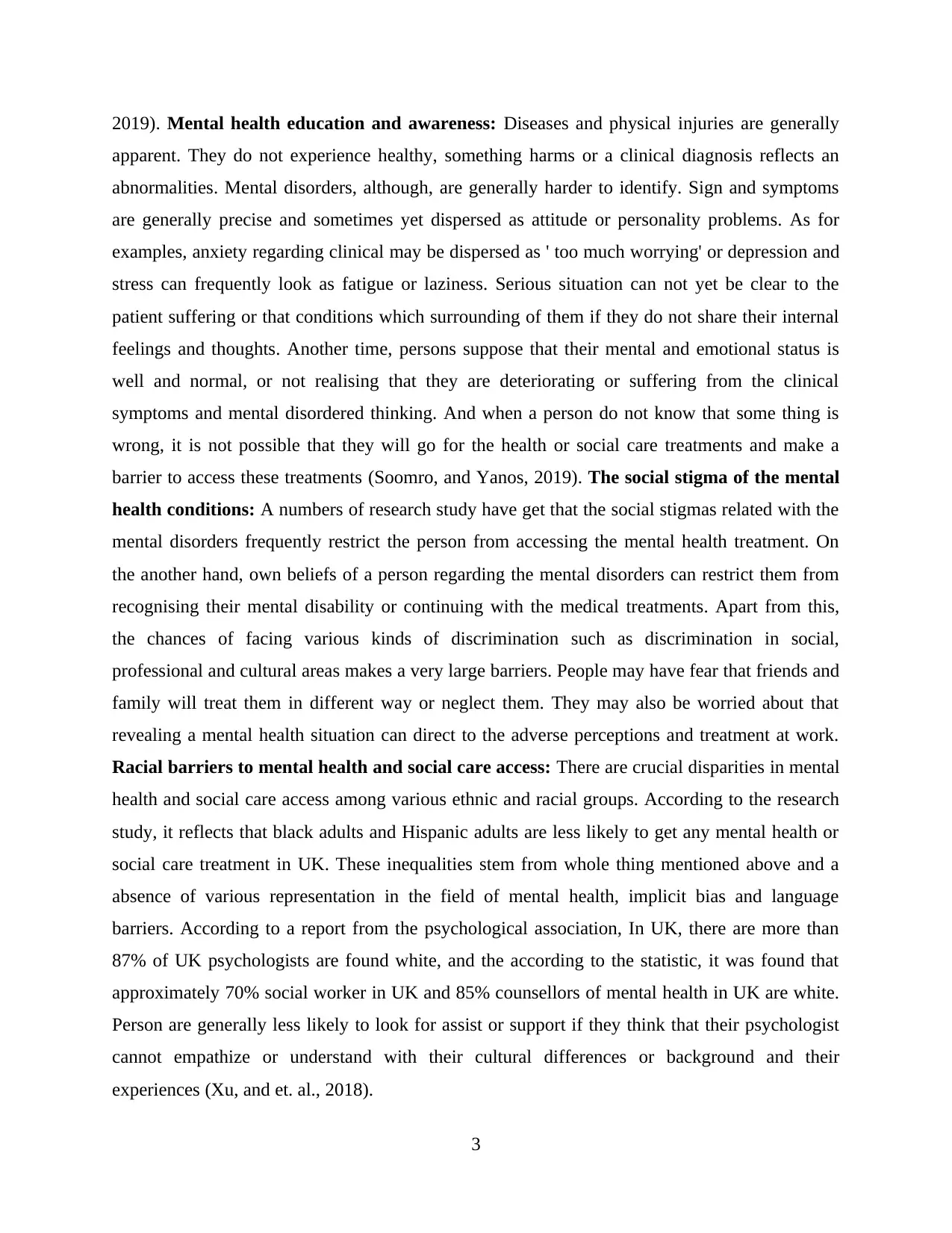
2019). Mental health education and awareness: Diseases and physical injuries are generally
apparent. They do not experience healthy, something harms or a clinical diagnosis reflects an
abnormalities. Mental disorders, although, are generally harder to identify. Sign and symptoms
are generally precise and sometimes yet dispersed as attitude or personality problems. As for
examples, anxiety regarding clinical may be dispersed as ' too much worrying' or depression and
stress can frequently look as fatigue or laziness. Serious situation can not yet be clear to the
patient suffering or that conditions which surrounding of them if they do not share their internal
feelings and thoughts. Another time, persons suppose that their mental and emotional status is
well and normal, or not realising that they are deteriorating or suffering from the clinical
symptoms and mental disordered thinking. And when a person do not know that some thing is
wrong, it is not possible that they will go for the health or social care treatments and make a
barrier to access these treatments (Soomro, and Yanos, 2019). The social stigma of the mental
health conditions: A numbers of research study have get that the social stigmas related with the
mental disorders frequently restrict the person from accessing the mental health treatment. On
the another hand, own beliefs of a person regarding the mental disorders can restrict them from
recognising their mental disability or continuing with the medical treatments. Apart from this,
the chances of facing various kinds of discrimination such as discrimination in social,
professional and cultural areas makes a very large barriers. People may have fear that friends and
family will treat them in different way or neglect them. They may also be worried about that
revealing a mental health situation can direct to the adverse perceptions and treatment at work.
Racial barriers to mental health and social care access: There are crucial disparities in mental
health and social care access among various ethnic and racial groups. According to the research
study, it reflects that black adults and Hispanic adults are less likely to get any mental health or
social care treatment in UK. These inequalities stem from whole thing mentioned above and a
absence of various representation in the field of mental health, implicit bias and language
barriers. According to a report from the psychological association, In UK, there are more than
87% of UK psychologists are found white, and the according to the statistic, it was found that
approximately 70% social worker in UK and 85% counsellors of mental health in UK are white.
Person are generally less likely to look for assist or support if they think that their psychologist
cannot empathize or understand with their cultural differences or background and their
experiences (Xu, and et. al., 2018).
3
apparent. They do not experience healthy, something harms or a clinical diagnosis reflects an
abnormalities. Mental disorders, although, are generally harder to identify. Sign and symptoms
are generally precise and sometimes yet dispersed as attitude or personality problems. As for
examples, anxiety regarding clinical may be dispersed as ' too much worrying' or depression and
stress can frequently look as fatigue or laziness. Serious situation can not yet be clear to the
patient suffering or that conditions which surrounding of them if they do not share their internal
feelings and thoughts. Another time, persons suppose that their mental and emotional status is
well and normal, or not realising that they are deteriorating or suffering from the clinical
symptoms and mental disordered thinking. And when a person do not know that some thing is
wrong, it is not possible that they will go for the health or social care treatments and make a
barrier to access these treatments (Soomro, and Yanos, 2019). The social stigma of the mental
health conditions: A numbers of research study have get that the social stigmas related with the
mental disorders frequently restrict the person from accessing the mental health treatment. On
the another hand, own beliefs of a person regarding the mental disorders can restrict them from
recognising their mental disability or continuing with the medical treatments. Apart from this,
the chances of facing various kinds of discrimination such as discrimination in social,
professional and cultural areas makes a very large barriers. People may have fear that friends and
family will treat them in different way or neglect them. They may also be worried about that
revealing a mental health situation can direct to the adverse perceptions and treatment at work.
Racial barriers to mental health and social care access: There are crucial disparities in mental
health and social care access among various ethnic and racial groups. According to the research
study, it reflects that black adults and Hispanic adults are less likely to get any mental health or
social care treatment in UK. These inequalities stem from whole thing mentioned above and a
absence of various representation in the field of mental health, implicit bias and language
barriers. According to a report from the psychological association, In UK, there are more than
87% of UK psychologists are found white, and the according to the statistic, it was found that
approximately 70% social worker in UK and 85% counsellors of mental health in UK are white.
Person are generally less likely to look for assist or support if they think that their psychologist
cannot empathize or understand with their cultural differences or background and their
experiences (Xu, and et. al., 2018).
3
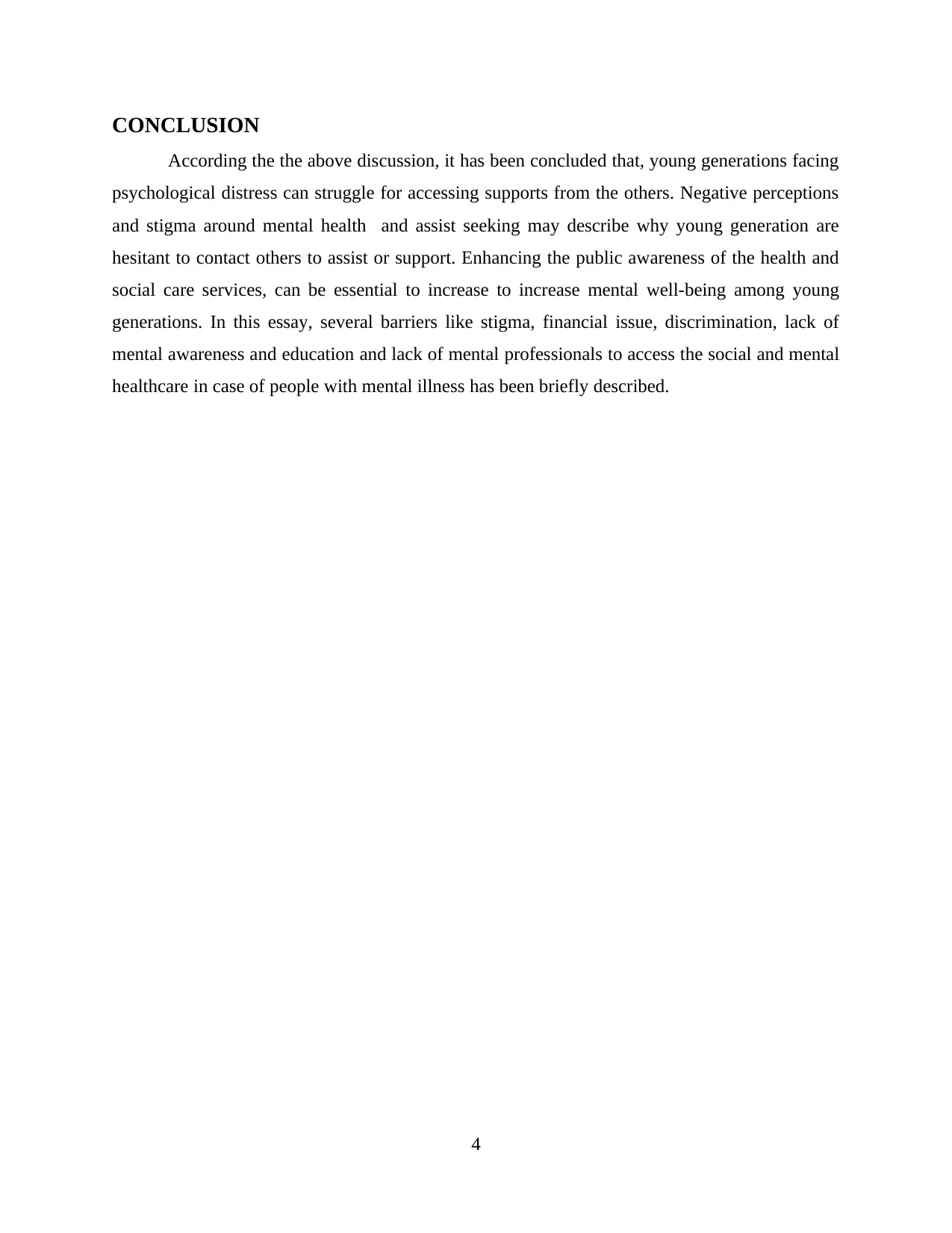
CONCLUSION
According the the above discussion, it has been concluded that, young generations facing
psychological distress can struggle for accessing supports from the others. Negative perceptions
and stigma around mental health and assist seeking may describe why young generation are
hesitant to contact others to assist or support. Enhancing the public awareness of the health and
social care services, can be essential to increase to increase mental well-being among young
generations. In this essay, several barriers like stigma, financial issue, discrimination, lack of
mental awareness and education and lack of mental professionals to access the social and mental
healthcare in case of people with mental illness has been briefly described.
4
According the the above discussion, it has been concluded that, young generations facing
psychological distress can struggle for accessing supports from the others. Negative perceptions
and stigma around mental health and assist seeking may describe why young generation are
hesitant to contact others to assist or support. Enhancing the public awareness of the health and
social care services, can be essential to increase to increase mental well-being among young
generations. In this essay, several barriers like stigma, financial issue, discrimination, lack of
mental awareness and education and lack of mental professionals to access the social and mental
healthcare in case of people with mental illness has been briefly described.
4
⊘ This is a preview!⊘
Do you want full access?
Subscribe today to unlock all pages.

Trusted by 1+ million students worldwide
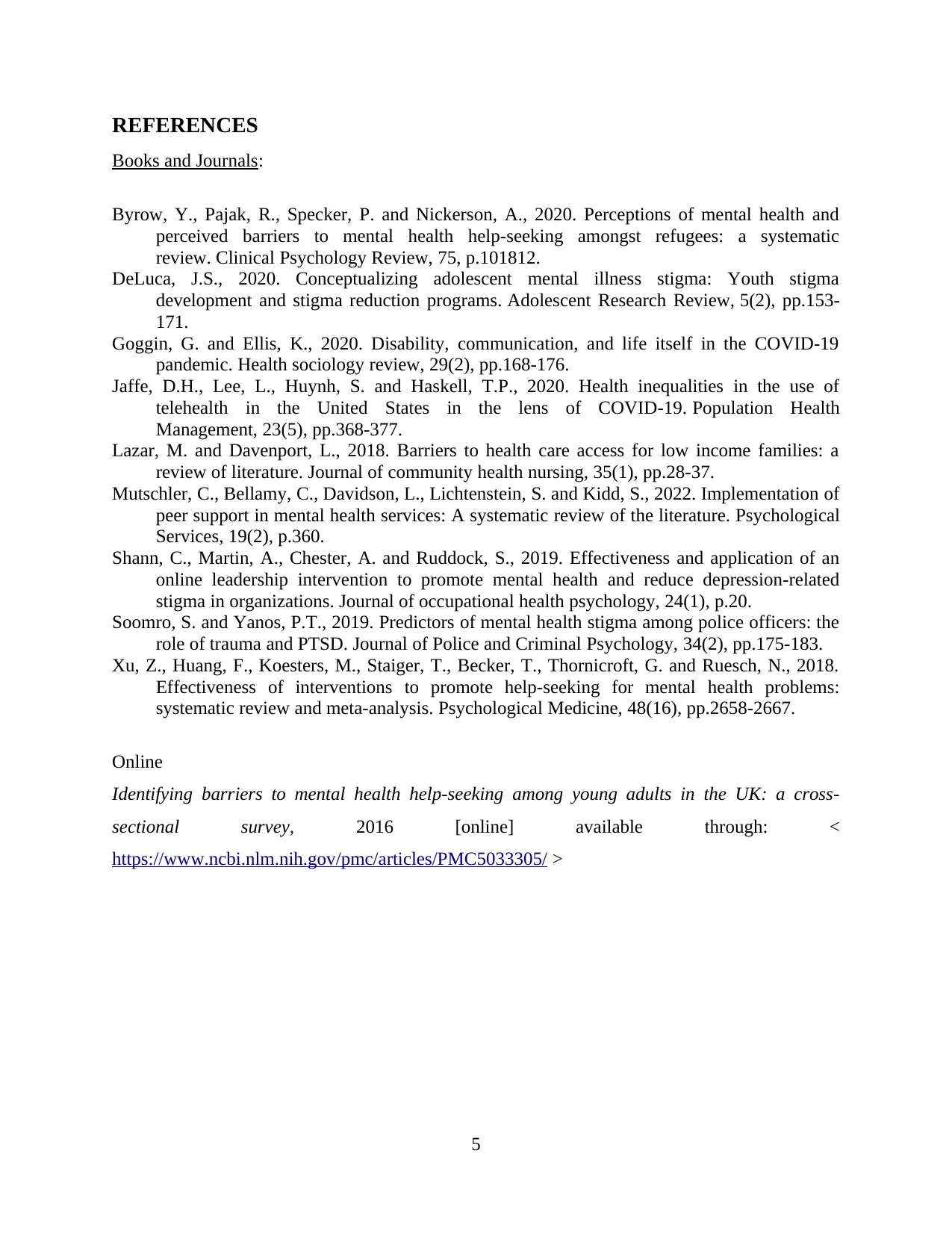
REFERENCES
Books and Journals:
Byrow, Y., Pajak, R., Specker, P. and Nickerson, A., 2020. Perceptions of mental health and
perceived barriers to mental health help-seeking amongst refugees: a systematic
review. Clinical Psychology Review, 75, p.101812.
DeLuca, J.S., 2020. Conceptualizing adolescent mental illness stigma: Youth stigma
development and stigma reduction programs. Adolescent Research Review, 5(2), pp.153-
171.
Goggin, G. and Ellis, K., 2020. Disability, communication, and life itself in the COVID-19
pandemic. Health sociology review, 29(2), pp.168-176.
Jaffe, D.H., Lee, L., Huynh, S. and Haskell, T.P., 2020. Health inequalities in the use of
telehealth in the United States in the lens of COVID-19. Population Health
Management, 23(5), pp.368-377.
Lazar, M. and Davenport, L., 2018. Barriers to health care access for low income families: a
review of literature. Journal of community health nursing, 35(1), pp.28-37.
Mutschler, C., Bellamy, C., Davidson, L., Lichtenstein, S. and Kidd, S., 2022. Implementation of
peer support in mental health services: A systematic review of the literature. Psychological
Services, 19(2), p.360.
Shann, C., Martin, A., Chester, A. and Ruddock, S., 2019. Effectiveness and application of an
online leadership intervention to promote mental health and reduce depression-related
stigma in organizations. Journal of occupational health psychology, 24(1), p.20.
Soomro, S. and Yanos, P.T., 2019. Predictors of mental health stigma among police officers: the
role of trauma and PTSD. Journal of Police and Criminal Psychology, 34(2), pp.175-183.
Xu, Z., Huang, F., Koesters, M., Staiger, T., Becker, T., Thornicroft, G. and Ruesch, N., 2018.
Effectiveness of interventions to promote help-seeking for mental health problems:
systematic review and meta-analysis. Psychological Medicine, 48(16), pp.2658-2667.
Online
Identifying barriers to mental health help-seeking among young adults in the UK: a cross-
sectional survey, 2016 [online] available through: <
https://www.ncbi.nlm.nih.gov/pmc/articles/PMC5033305/ >
5
Books and Journals:
Byrow, Y., Pajak, R., Specker, P. and Nickerson, A., 2020. Perceptions of mental health and
perceived barriers to mental health help-seeking amongst refugees: a systematic
review. Clinical Psychology Review, 75, p.101812.
DeLuca, J.S., 2020. Conceptualizing adolescent mental illness stigma: Youth stigma
development and stigma reduction programs. Adolescent Research Review, 5(2), pp.153-
171.
Goggin, G. and Ellis, K., 2020. Disability, communication, and life itself in the COVID-19
pandemic. Health sociology review, 29(2), pp.168-176.
Jaffe, D.H., Lee, L., Huynh, S. and Haskell, T.P., 2020. Health inequalities in the use of
telehealth in the United States in the lens of COVID-19. Population Health
Management, 23(5), pp.368-377.
Lazar, M. and Davenport, L., 2018. Barriers to health care access for low income families: a
review of literature. Journal of community health nursing, 35(1), pp.28-37.
Mutschler, C., Bellamy, C., Davidson, L., Lichtenstein, S. and Kidd, S., 2022. Implementation of
peer support in mental health services: A systematic review of the literature. Psychological
Services, 19(2), p.360.
Shann, C., Martin, A., Chester, A. and Ruddock, S., 2019. Effectiveness and application of an
online leadership intervention to promote mental health and reduce depression-related
stigma in organizations. Journal of occupational health psychology, 24(1), p.20.
Soomro, S. and Yanos, P.T., 2019. Predictors of mental health stigma among police officers: the
role of trauma and PTSD. Journal of Police and Criminal Psychology, 34(2), pp.175-183.
Xu, Z., Huang, F., Koesters, M., Staiger, T., Becker, T., Thornicroft, G. and Ruesch, N., 2018.
Effectiveness of interventions to promote help-seeking for mental health problems:
systematic review and meta-analysis. Psychological Medicine, 48(16), pp.2658-2667.
Online
Identifying barriers to mental health help-seeking among young adults in the UK: a cross-
sectional survey, 2016 [online] available through: <
https://www.ncbi.nlm.nih.gov/pmc/articles/PMC5033305/ >
5
1 out of 7
Related Documents
Your All-in-One AI-Powered Toolkit for Academic Success.
+13062052269
info@desklib.com
Available 24*7 on WhatsApp / Email
![[object Object]](/_next/static/media/star-bottom.7253800d.svg)
Unlock your academic potential
Copyright © 2020–2025 A2Z Services. All Rights Reserved. Developed and managed by ZUCOL.





